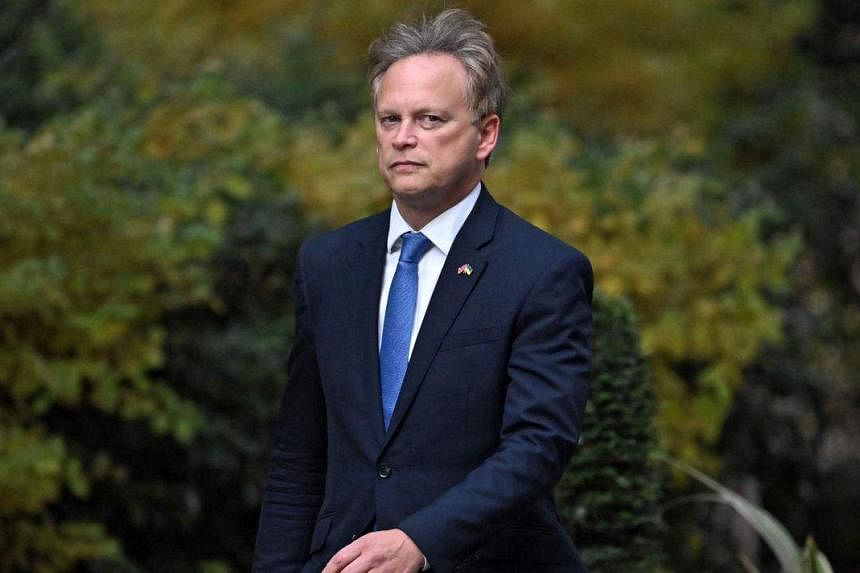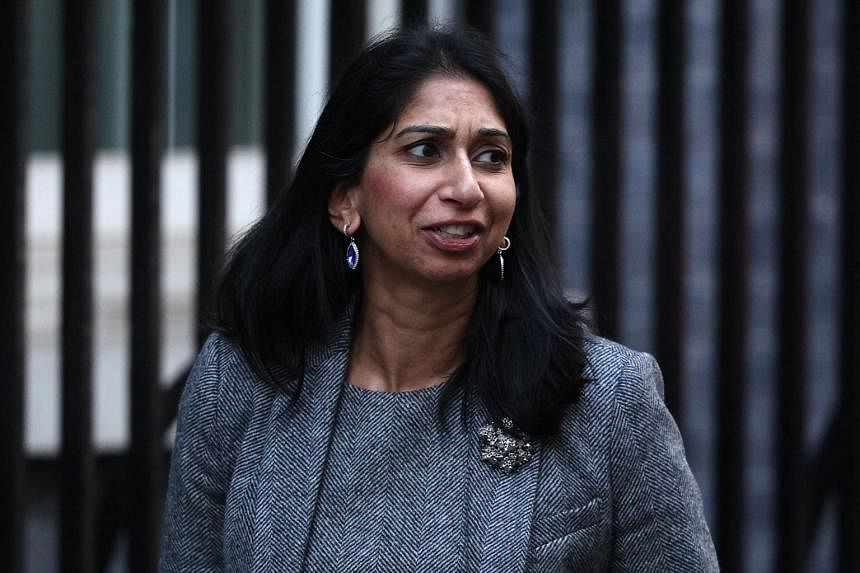LONDON - Britain’s interior minister quit on Wednesday with a thinly-veiled criticism of Prime Minister Liz Truss, who is battling to reassert her authority as lawmakers from her own party openly call on her to quit.
The departure of Ms Suella Braverman, over a “technical” breach of government rules, means Ms Truss has now lost two of her most senior ministers in less than a week, both replaced by politicians who had not backed her for the leadership.
Mr Grant Shapps, who on Oct 4 said Ms Truss only had 10 days to save her premiership, will replace Braverman in a bid by the prime minister to quell a growing rebellion by bringing critics into the fold.
Truss, in power for just over six weeks, has been fighting for her political survival ever since Sept 23, when she launched a “mini-budget” - an economic programme of vast unfunded tax cuts that sent shockwaves through financial markets.
But in scenes not often witnessed in parliament, confusion over whether a vote on fracking was a confidence vote in Ms Truss’ administration saw lawmakers openly rowing and jostling. There were also reports of politicians being manhandled to make them vote with the government.
“Discipline is falling apart, we can’t go on like this,” one Conservative lawmaker told Reuters, adding that at least one of the government’s parliamentary enforcers had resigned.
The latest turn in what seems to be a never-ending political drama at Westminster comes as millions of Britons worry about rising inflation and cuts to public spending, with the politic elite seen to be doing little to ease those concerns.
Ms Truss had just told lawmakers that she was sorry for the mistakes she had made but was not going to quit, when reports swirled that her interior minister, or home secretary, had gone.
Confirming her departure, Ms Braverman said she had broken the rules by sending an official document from her personal email to a parliamentary colleague. But she added she was worried about the government and that just hoping problems would go away was not a viable approach.
“I have made a mistake, I accept responsibility, I resign,” she said in a letter to the prime minister.
Her replacement also failed to offer a ringing endorsement of Ms Truss. On arrival at his new workplace, Mr Shapps admitted the government had “obviously had a very difficult period.”
But he added, referring to Truss’ new finance minister: “Jeremy Hunt, I think, has done a great job of settling the issues relating to that mini budget.”

Media reports suggested Ms Truss and Ms Braverman may have clashed over immigration. Ms Braverman, who said recently that she dreamt of seeing asylum seekers being deported to Rwanda, has advocated a hard line on immigration numbers.
Ms Truss had suggested immigration restrictions could be lifted in some sections of the economy; as Hunt works to find ways to boost the economy, easing immigration rules further could be one option.
Laughter and jeers
After a move to make a vote on fracking a confidence matter, scenes in parliament descended into chaos as Conservative lawmakers were confused over whether they were obliged to vote in line with the government.
As they went to vote, opposition lawmakers said they saw Conservatives trying to physically force their colleagues to vote with the government.
Mr Chris Bryant, a senior Labour lawmaker, told the chamber he had seen lawmakers being “physically manhandled” and “bullied” to vote with the Conservatives.
Two Conservative lawmakers said they had not seen any such behaviour.
“Just watched the deputy prime minister practically pick up a hesitant Tory MP (Conservative member of parliament) and march him into the government lobby. Astonishing,” Mr David Linden, a lawmaker for the Scottish National Party, said on Twitter.
The Labour motion was defeated by 326 votes to 230 and the government proposal won, but some lawmakers said they were angry over the tactics, or lack of, used by the government.
Voting results showed that 40 Conservative lawmakers did not take part in the vote, although some of those were on work trips or unwell.
Hours earlier, Ms Truss faced a raucous prime minister’s questions session in parliament for the first time since Hunt scrapped most of her tax-cutting plan. She came out fighting.
Asked by the leader of the main opposition Labour Party, Keir Starmer, why she should remain in power, she said: “I am a fighter and not a quitter.”
“I have been very clear that I am sorry, and I have made mistakes,” Truss told jeering opposition lawmakers in parliament.
“I’m prepared to take the tough decisions.”
The prime minister was met with laughter, boos and jeers, especially when she told the opposition Labour Party it needed to grasp economic reality.
She also tried to appease lawmakers over her future spending plans. After days of uncertainty, she said she was committed to increasing state pension payments in line with the level of inflation.
But some were not convinced.
Conservative lawmaker William Wragg said he had submitted a letter of no confidence in the prime minister, joining a handful of others who have called for her to go. Mr Wragg said he was “ashamed” of facing voters after the so-called mini-budget.
Former science minister, George Freeman, said; “Enough is enough. The Cabinet need to get a grip, fast, to restore collective responsibility and confidence.”
Balancing the books
Ms Truss was elected on Sept 6 by Conservative members on a promise of tax cuts and maintaining public spending.
She is under pressure despite apologising for going “too far and too fast” with an economic programme that prompted investors to dump the pound and government bonds, leaving her and Hunt desperately trying to balance the books.
Markets have somewhat stabilised since, but with mortgage rates increasing and official figures showing inflation back to a 40-year high, Truss faces a struggle to convince the public and her party that she can tackle a cost-of-living crisis.
Her Conservative Party is some 30 points behind Labour Party, according to opinion polls, and YouGov ranks her as the most unpopular leader the pollster has ever tracked. REUTERS

